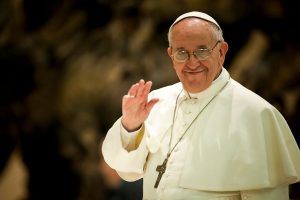Poor Man’s Pope

With the passing away of Pope Francis on 21 April at the age of 88, a great chapter of the papal history has been closed. Born Jorge Mario Bergoglio to Italian migrants in Buenos Aires in 1936, he made history through his elevation as the first Latin American and member of the Jesuit order to be elected Pope in the church’s existence for over 2000 years. He proved that he was extraordinary when he became the first Pope to call himself Francis, shorn of the pomp and grandeur associated with the title.
After assuming office, the Argentinean pontiff soon attracted global attention as a moderniser, with an outward-looking approach that propelled him to speak out boldly on humanitarian crises, such as migration, war and climate change. While the church was riddled with allegations of corruption and varied forms of malpractices the world over, he sought to reform it by taking head-on the elitist mentalities among the clergy. He exhorted them to display a compassionate approach to divorced and gay Catholics insisting that the church welcome everyone. This was not an easy task, given the fact that there were ultra-conservative elements within the papal establishment that found his new approach abhorrent. But, he could not care less and went on taking a series of measures to clean up financial corruption in the Vatican and fight against the scourge of clerical sexual abuse, introducing laws to hold bishops accountable for cover-ups. Francis also sought an enlarged role for women working in the Vatican and authorised priests to offer blessings to same-sex couples.
In a world fraught with religious conflicts, fanaticism and mindless wars caused by autocrats, Pope Francis tried to build bridges with the Moslems and play the role of peacemaker in the face of global conflicts, including in Ukraine and the Middle East. It is a reflection of his lofty idealism that he never took possession of the ornate papal apartments in the Apostolic Palace used by his predecessors. With a typical remark he explained his position asserting he preferred to live in a community setting for his “psychological health.”
It is a measure of his leadership that he was elected with a clear mandate to cleanse the church that had been under attack over child sexual abuse scandals and torn by infighting in the Vatican bureaucracy. But as in the case of many religious reformers, Francis too had to face fierce criticism from both the conservatives, who accused him of trampling down cherished traditions, and also the progressives, who felt he should have done much more to stem the rot.
But, as he went on with his mission in the teeth of internal dissent, Francis became a virtual global superstar. He drew huge crowds on his many foreign travels as he spared no pains to promote interfaith dialogue and peace and take the side of the marginalised, such as migrants. There is no doubt he should have done more, as progressive Catholics felt, allowing the ordination of married men as priests, shifting official teaching on homosexuality and giving a greater space for women in ministry. Despite taking a series of tough measures, Francis was unable to curb child sexual abuse and other forms of abuse that have plagued the Catholic Church.
However, at a time when the US President Donald Trump has started to rewrite world history with his ideas, including a war against migrants, the Pope tirelessly championed the causes of the underprivileged. He also became a symbol of staunch opposition to the rise of nationalist populism. It is a great tribute to him that he is known as the Pope of the poor. His humble background and work for the poor are seen as a contrast to the perceived opulence of the papacy. He came from a working-class family and throughout his career emphasised his commitment to serve the ordinary people, often speaking out against wealth inequality and advocating social justice.
His absence at this hour of global crisis would be noticeable.
News